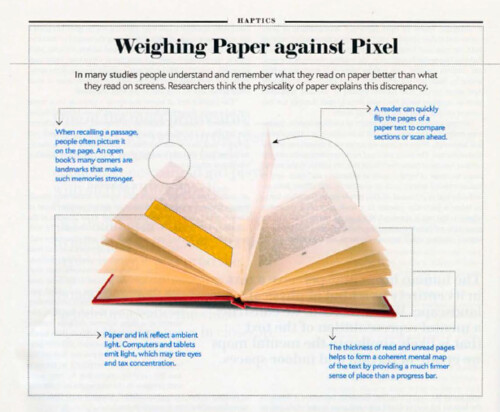
PREV ARTICLE
NEXT ARTICLE
FULL ISSUE
PREV FULL ISSUE
WHY PAPER STILL BEATS SCREENS
Bill Eckberg forwarded an article from the November 2013 Scientific American. I've included an excerpt below. He writes: "Why the Brain Prefers Paper
discusses a number of studies that have investigated differences in comprehension between reading on a computer screen and reading a book. It's pretty interesting."
-Editor
One of the most provocative viral YouTube videos in the past two years begins mundanely enough: a one-year-old girl plays with an iPad, sweeping her fingers across its touch screen and shuffling groups of icons. In following scenes, she appears to pinch, swipe and prod the pages of paper magazines as though they, too, are screens. Melodramatically, the video replays these gestures in close-up. For the girl's father, the video- A Magazine is an iPad That Does Not Work -is evidence of a generational transition. In an accompanying description. he writes, "Magazines are now useless and impossible to understand, for digital natives"-that is, for people who have been interacting with digital technologies from a very early age, surrounded not only by paper books and maga1ines but also by smartphones, Kindles and iPads. Whether or not his daughter truly expected the magazines to behave like an iPad, the video brings into focus a question that is relevant to far more than the youngest among us: How exactly does the technology we use to read change the way we read? Since at least the 1980s researchers in psychology, computer engineering. and library and information science have published more than 100 studies exploring differences in how people read on paper and on screens. Before 1992 most experiments concluded that people read stories and articles on screens more slowly and remember less about them. As the resolution of screens on all kinds of devices sharpened, however, a more mixed set of findings began to emerge. Recent surveys suggest that although most people still prefer paper-especially when they need to concentrate for a long time-attitudes are changing as tablets and e-reading technology improve and as reading digital texts for facts and fun becomes more common. In the U.S., e-books currently make up more than 20 percent of all books sold to the general public. Despite all the increasingly user-friendly and popular technology, most studies published since the early 1990s confirm earlier conclusions: paper still has advantages over screens as a reading medium. Together laboratory experiments, polls and consumer reports indicate that digital devices prevent people from efficiently navigating long texts, which may subtly inhibit reading comprehension. Compared with paper, screens may also drain more of our mental resources while we are reading and make it a little harder to remember what we read when we are done. Whether they realize it or not, people often approach computers and tablets with a state of mind less conducive to learning than the one they bring to paper.

To read the complete article (subscription required), see:
The Reading Brain in the Digital Age: Why Paper Still Beats Screens
(www.scientificamerican.com/article.cfm?id=the-reading-brain-in-the-digital-age-why-paper-still-beats-screens)
The Numismatic Bibliomania Society is a non-profit organization promoting numismatic literature. See our web site at coinbooks.org. To submit items for publication in The E-Sylum, write to the Editor at this address: whomren@gmail.com To subscribe go to: https://my.binhost.com/lists/listinfo/esylum All Rights Reserved. NBS Home Page Contact the NBS webmaster 
|